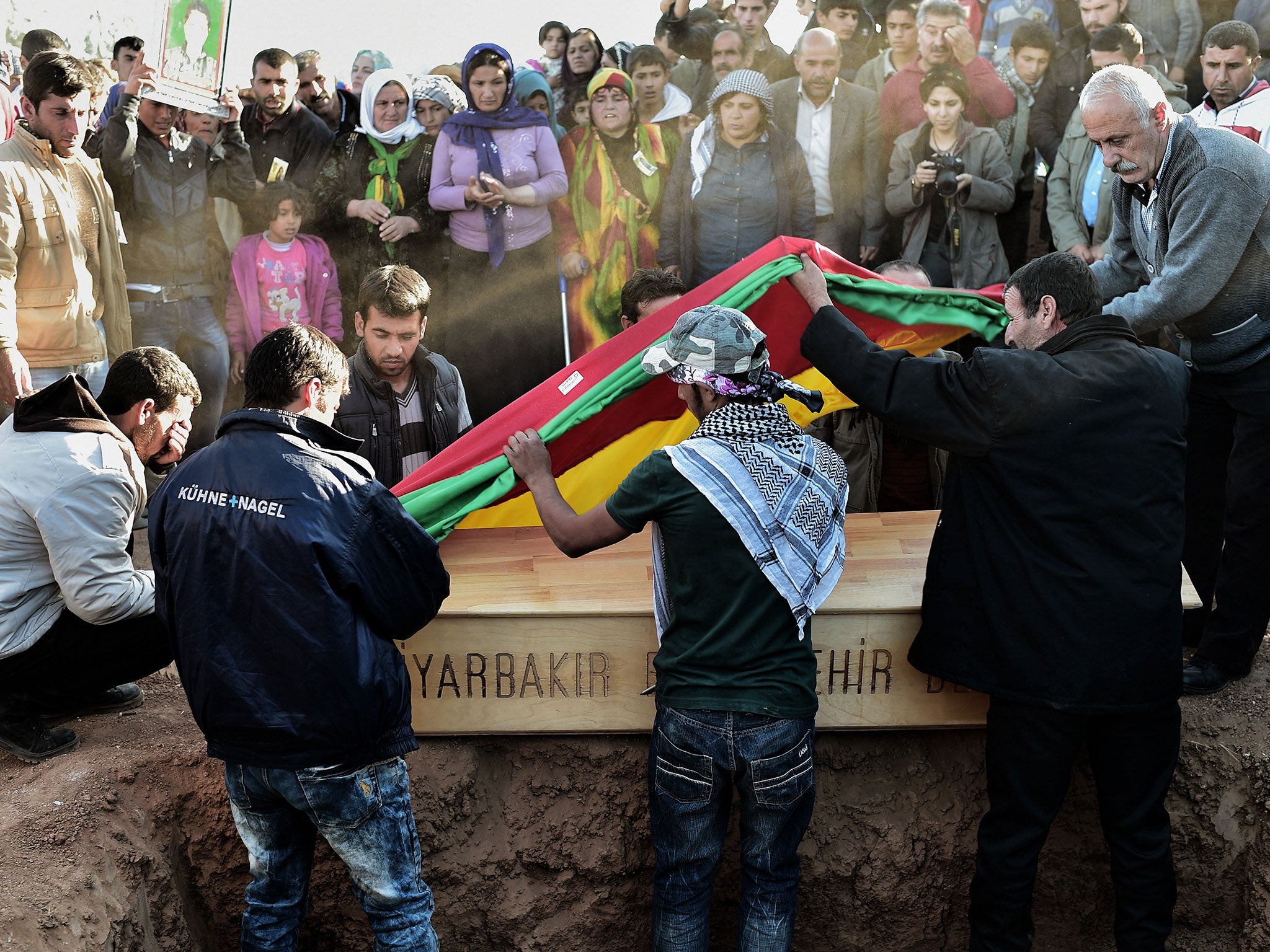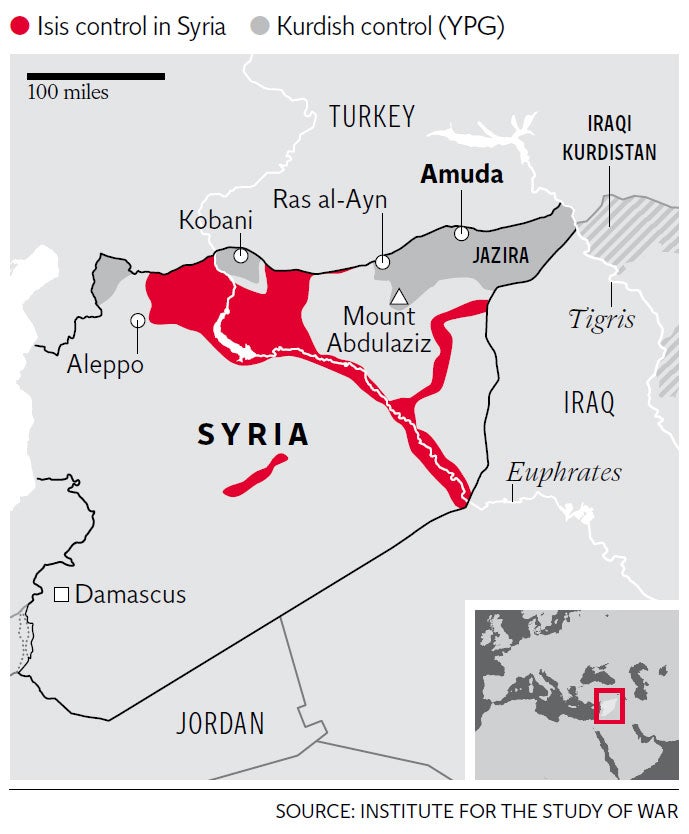Isis in Syria: The Kurdish enclave still resisting the tyranny of President Assad and militant fighters
In Syrian Kurdish cantons along the Turkish border, the progressive aims of the 2011 uprising are being enacted despite the war. Patrick Cockburn returns to Amuda

Your support helps us to tell the story
From reproductive rights to climate change to Big Tech, The Independent is on the ground when the story is developing. Whether it's investigating the financials of Elon Musk's pro-Trump PAC or producing our latest documentary, 'The A Word', which shines a light on the American women fighting for reproductive rights, we know how important it is to parse out the facts from the messaging.
At such a critical moment in US history, we need reporters on the ground. Your donation allows us to keep sending journalists to speak to both sides of the story.
The Independent is trusted by Americans across the entire political spectrum. And unlike many other quality news outlets, we choose not to lock Americans out of our reporting and analysis with paywalls. We believe quality journalism should be available to everyone, paid for by those who can afford it.
Your support makes all the difference.The last time I crossed the Tigris River between Iraqi Kurdistan and Syria was just before the war in 2003 when I was coming from Damascus. I crossed in an elderly flat-bottomed metal boat, its decrepit appearance making me afraid that the engine would give out and we would drift down river into territory controlled by Saddam Hussein’s forces.
Last week I crossed the Tigris again going in the opposite direction, travelling from the autonomous Kurdistan Regional Government (KRG) territory into the isolated Syrian Kurdish statelet in north-east Syria known as “Jazira”. Its defenders are the only military force in Iraq and Syria to have repeatedly defeated Isis and Jabhat al-Nusra, the Syrian affiliate of al-Qaeda.
Saddam Hussein is long gone and the political geography of the whole region has been transformed by war in the past 11 years since I last passed this way. One feature of the journey that has not changed is that it is the same old metal boat taking us across the river. Another unchanged feature is the misery and frustration of people trying to cross between Syria and Iraq to escape violence and poverty. I saw a distraught woman and her children evicted from the boat because just one letter was wrong in the documents she needed to cross. “I have been waiting three days on the river bank,” she said in a voice of anguish as her bundles of belongings were tumbled back onto the rough concrete jetty.
Many Syrian Kurds I met were jubilant because their forces had just captured Mount Abdulaziz, a 25-mile long mountain that will protect their enclave from Isis fighters to the south. Jazira is the largest of three Syrian Kurdish cantons strung along the Turkish border which are collectively known as Rojava. Kurdish militia (YPG) are fighting to link the Jazira enclave with that at Kobani, the target of the historic 134-day-long siege by Isis.
Almost entirely cut off from the outside world, Jazira has fertile fields full of people and machinery harvesting the wheat. Interspersed with the crops are nodding donkeys which once pumped oil but today are almost all inactive.
Siham Qaryo, head of the main supervisory economic body, says that “enough crude is roughly refined to fuel big electricity generators, but petrol for vehicles is smuggled in by traders which is often risky for them”. She says the state authorities are very short of money because of the needs of war, but “we are self-sufficient in most foodstuffs such as flour, cotton, cattle and sheep”. Food prices are not high, a meal for four in a restaurant in the town of Amuda costing the equivalent of £18.
Though few among the Arab opposition to President Bashar al-Assad would admit it, the Kurdish areas are the only place in Syria where the original progressive aims of the uprising of 2011 have been achieved at least in part. There are women in the army and the police and women hold more than 40 per cent of official jobs according to Ms Qaryo. This is in contrast to Isis and Jabhat al-Nusra – the Kurds say that the two groups are “the children of al-Qaeda” and largely indistinguishable – in whose territory women are reduced to semi-slavery or, in the case of the Yazidis, actual slavery. Likewise, Christians are not persecuted and forced to flee as they are within the Islamic State.
Rojava is a highly militarised society, power effectively monopolised by the PYD and YPG militia, which are in practice the Syrian branch of the PKK, the Turkish Kurd movement that has been fighting the Turkish army since 1984. It is the organisational and military experience of the PKK – combined with US airstrikes – that has enabled the Syrian Kurds to defeat Isis at Kobani and Mount Abdulaziz.

Their experience has been in stark contrast to the fight against Isis elsewhere in Iraq and Syria. The renewed operation to retake Anbar after the humiliating loss of the city of Ramadi by a beleaguered Iraqi army got off to a bad start, with a wave of Isis car bombs that killed 17 troops near Fallujah.
Not everybody in Rojava likes or agrees with the PYD ruling party. It has a cult of personality focused on the imprisoned PKK leader Abdullah Ocalan, whose picture adorns every office. It lauds martyrdom in defence of the Kurds and their society. The other picture on office walls is that of a young woman called Arin Mirkan who blew herself up to stop an Isis advance at Kobani. Kurdish fighters killed in the battle for Mount Abdulaziz were given elaborate funerals to celebrate their sacrifice for the national cause.
Aram Ahmed, a burly, bearded man who wears a white T-shirt with a slogan on it reading “Choose Life”, says that he is against all forms of religious and nationalist extremism. In the small city of Amuda, he has set up the Baraaem Centre for Children, where boys and girls between the ages of six and 16 learn music, painting, chess, drama and foreign languages. He says: “Everybody here is caught up in war and before that we had 40 or 50 years of tyranny [under the Baath Party].”
Some 220 children are attending the school which was originally the idea of Mahmoud Shekhe, a local businessman with two clothes shops who has almost bankrupted himself keeping it going. Mr Aram says “this is the only centre like this in the whole region and I am trying to help build personalities not entirely shaped by war and extremism”. He is short on helpers since he does not have the money to pay them, but the children are enthusiastic and engaged.
Critical of the PYD and PKK for their militarism, Mr Ahmed is caustic about the US and its allies helping the Syrian Kurds with airstrikes, but “refusing to give us weapons to fight on the ground”. He adds that though he does not like the PKK, it is hypocritical of “the Americans and Europeans to label them as ‘terrorists’” when they are fighting Isis in Syria and Iraq.
He himself has been a refugee three times since the Syrian uprising began in 2011, but says he is now determined to stay in Rojava whatever happens. He gives a humorous account of his life as a refugee in Lebanon, Turkey and KRG, saying that, while refugees may originally have fled abroad because of violence and poverty at home, they were also drawn by fantasies such as, for instance, that “the KRG is full of money”. Mr Ahmed says he came to hate the blue colour of the UNHCR because of the dependency it symbolised and adds that many Kurdish refugees “had become ashamed to return home”.
Amuda has suffered losses during the war, though it is nothing like as battered as towns like Ras al-Ayn or the 80 per cent destruction at Kobani. Curiously, the local tragedy best remembered in the town took place half a century ago on 13 November 1960 when the local cinema caught fire while children were watching a film on the Algerian uprising and at least 199 were burned to death.
Their pictures and names are inscribed on a wall behind a statue in a little park filled with tall pine trees. Nearby is the mosaic of a young man called Mohammed Said Agha Daqory, who had been sitting in a café near the cinema when the fire started and had repeatedly rushed into the blazing building to rescue children until he was burned to death.
As we were closing the gate into the park there was a reminder that not everybody is concerned with the issues of war and peace. An elderly man with white hair rushed past us and started searching frantically for something among the pine trees. “Have you seen my pet rabbit?” he shouted to us. “She disappeared here last night and I am so worried the cats will eat her.”
Join our commenting forum
Join thought-provoking conversations, follow other Independent readers and see their replies
Comments